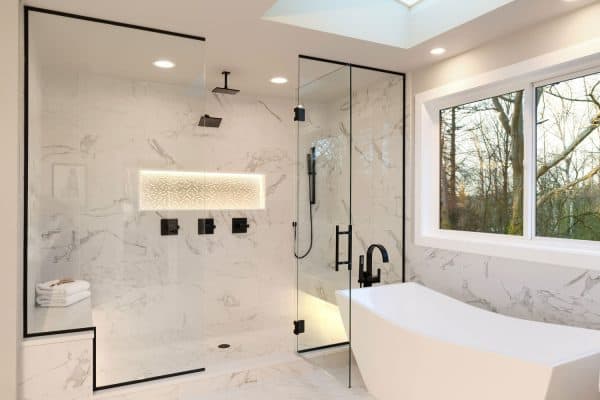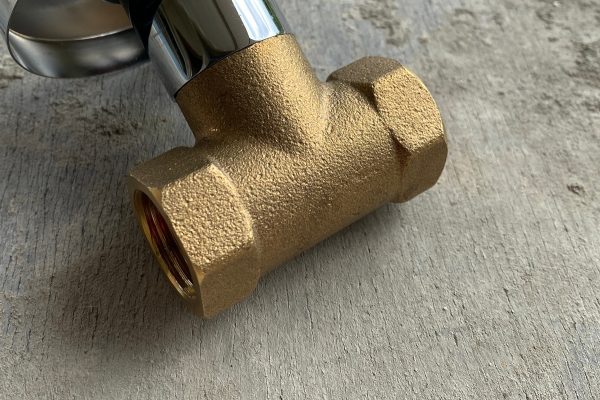You want your bathroom to shine, but you also want it to be safe for your family, as well as having an area that is easy to maintain. It's time to redo the tiles, and you're wondering if matte or glossy tile will work best. We've researched for you to compile the best information.
The decision to use matte or glossy tile for your shower really comes down to personal preference and the size of the space in question. Matte tile is slip-resistant, shows less grime, and can offer a more rustic look to your bathroom. Glossy makes the room appear larger, is easy to clean, and brightens up your space. The downside to matte tile is that it is more difficult to clean when it needs it. As far as glossy tiles are concerned, they are quite slippery and require cleaning more frequently.
Now that you know the basic rundown on the pros and cons of matte and glossy tile read on to find as we elaborate on each aspect of these tile characteristics for your shower.
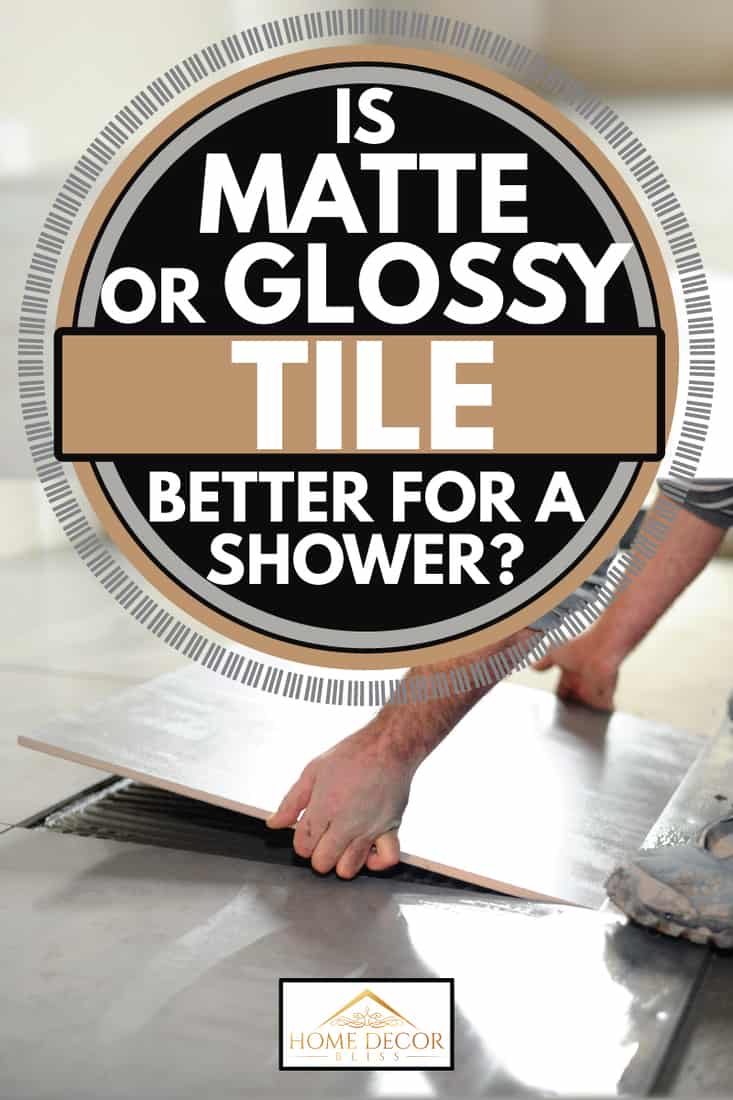
The Pros Of Matte Tile
Slip-Resistant
Due to the matte finish, tiles with this type of surface are nowhere near as slippery as glossy tiles. Never use glossy tiles on the floor of a shower or tub as this could be dangerous. Matte offers much more traction. Even matte tiles are not completely slip-proof, so take all necessary precautions when installing and using your shower.
Requires Less Cleaning
Matte tiles don't show grime the way glossy tiles do. The reflective surface of the glossy tile will show soap scum and water stains very quickly. If you're someone who doesn't like to clean the shower in-between uses, matte tile is the best way to go.
Can Enhance a Rustic Look
Matte tiles come in various styles and can closely replicate wood, cement, or even rock. Rustic and farmhouse decor are super popular right now, so if you're aiming to decorate in this type of style, look at the many options available in a matte finish.
The Pros Of Glossy Tile
Enlarges the Room
Since glossy tiles have a reflective surface, the quality of the finish makes your room appear larger, similar to the way mirrors enlarge a room. If you're working with limited space and wish to create the illusion of a big room, glossy tile is the best option.
Easy to Clean
Because of the smooth surface of the glossy tile, dirt and grime don't cling to it as easily as with a matte finish. The more porous a surface is, the harder it will be to get clean. This is where matte fails, and gloss truly shines.
Brightens the Room
The reflective quality of glossy tile enhances the artificial and natural light of your bathroom. Glossy tile is an excellent addition to a bathroom that is completely lacking in natural light. If your bathroom tends to seem dark, glossy will brighten up the room without a bunch of expensive new lighting.
The Cons Of Matte Tile
Requires More Elbow Grease to Clean
Although matte tile doesn't show as much dirt and water stains, it is more difficult to clean due to the porous surface. You won't have to clean it as often, but it will take more effort to get it spotless when it is time to clean.
The Cons Of Glossy Tile
Slippery
Tile with a glossy surface is quite slippery! This tile shouldn't be used for a shower floor as any tile can get slippery when wet, but glossy is especially dangerous because it lacks traction. Even just on the walls, the matte tile would offer some help if someone began to slip; if someone falls against glossy tile they will slip right to the floor.
So What is the Best Type of Tile for a Shower?
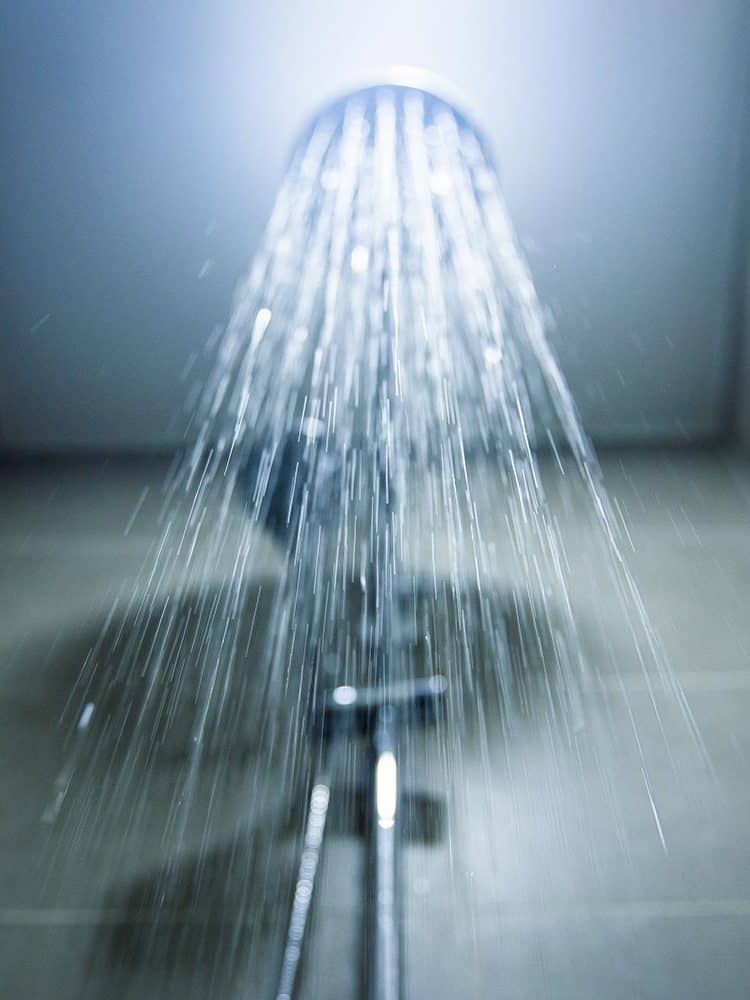
The best type of tile for a shower is made of ceramic, as it is naturally waterproof. For the floor of a shower, a mosaic pattern is best, as it is easier to slope inward toward the drain when the tile is in small pieces. Additionally, it requires more grout to create the mosaic, which adds additional slip resistance. Ceramic tiles are also resistant to bacteria so it will help keep your feet healthy.
Porcelain is also an option if you're installing an outdoor shower, though porcelain is more expensive. Ceramic tile could crack under extreme cold.
For more information on the choice between porcelain and ceramic, read "Is Porcelain or Ceramic Tile Better for Showers?"
How Do You Keep Shower Tiles Clean?
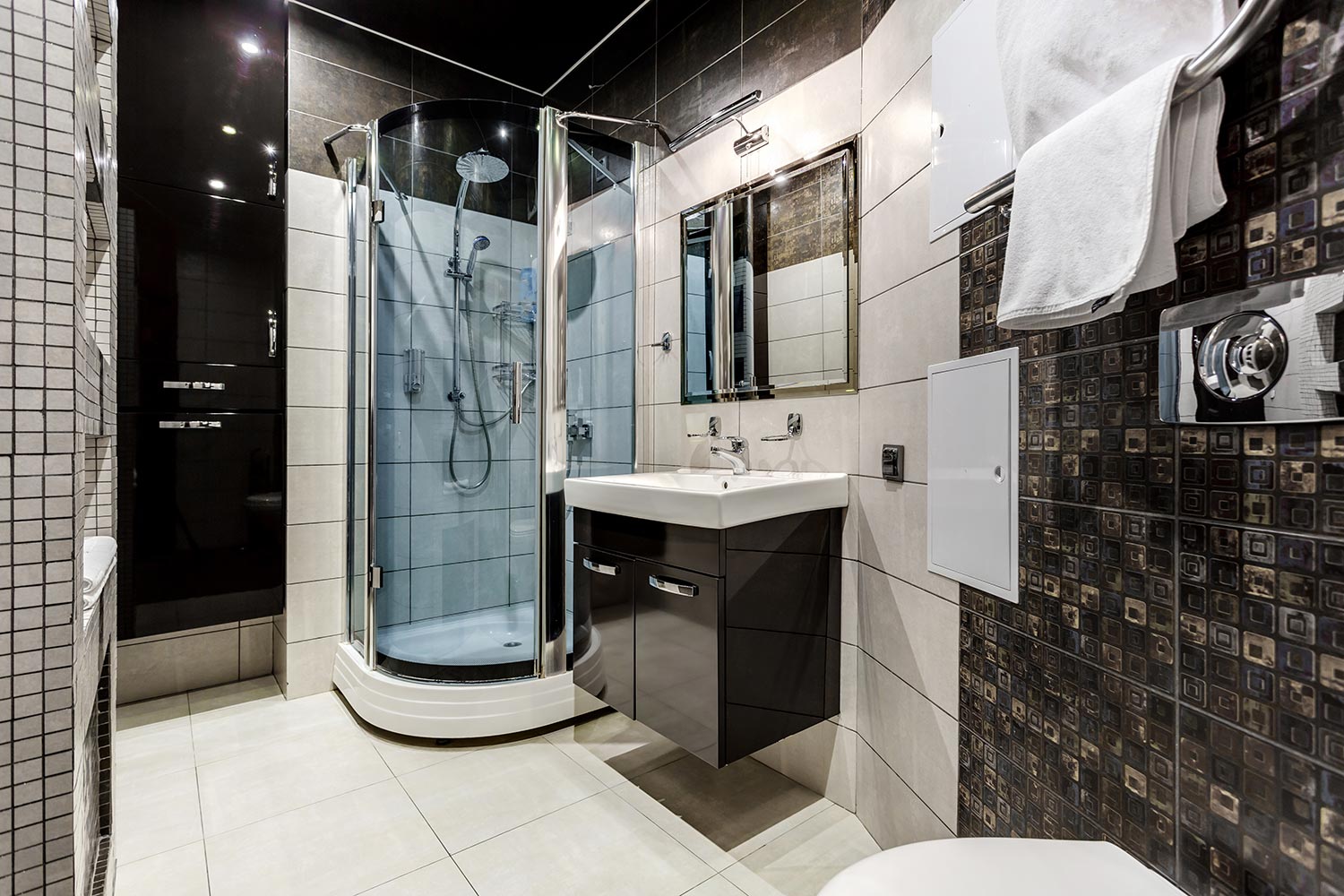
The best way to keep your shower tiles clean is to use a daily shower cleaner each day after showering. Using a cleaner daily (just spray) makes it much easier when a thorough cleaning is required.
A quick and easy way to ensure the integrity of the grout in between scrubbing is to use a squeegee on the tile after showering, but before spraying the daily shower cleaner. This allows a more concentrated shot of the daily shower cleaner to sit on the tile.
Once it is time to do a thorough scrubbing, pay close attention to the grout between the tiles as this is where stains try to set. Use a simple vinegar solution and scrubbing brush. Mix one part vinegar to three parts water for an inexpensive clean. If you'd prefer, there are many commercial tile cleaners you can purchase and get the same results.
What Size Tile is Best for Shower Walls?
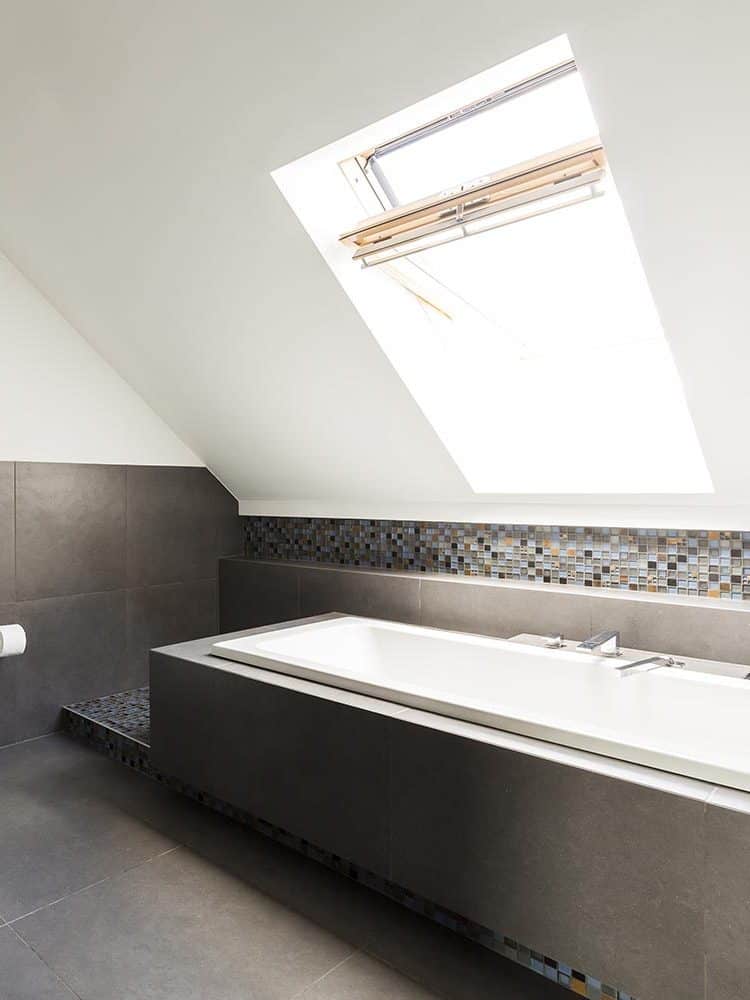
Larger tiles are best for the walls of the shower. Doing a mosaic anywhere but the floor can create a very busy visual. Avoid using tiles smaller than 4 x 4 inches. Tiles can be as large as 15 x 30 inches depending on your project.
How Much Does it Cost to Install Tile in a Shower?
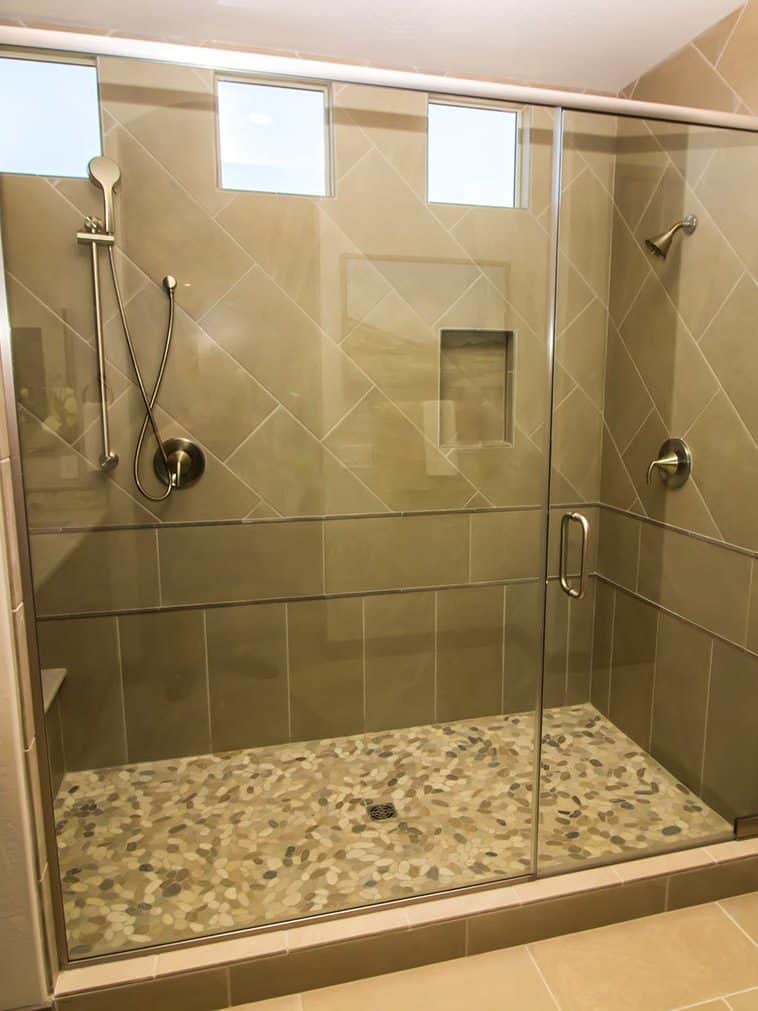
Homeguide.com advises the average cost to tile a shower ranges from $7 to $25 per square foot. Most homeowners spend between $270 to $780 for glazed ceramic, and from $499 to $1,440 for porcelain tiling. Large, walk-in showers are naturally going to go up in price for the larger space. Most homeowners do not tile the floor of the shower.
Should the Bathroom Floor and Shower Tile Match?
Matching the bathroom floor and shower tile is a personal design preference. Although they do not need to match exactly, they shouldn't clash with each other. Two colors in the same spectrum create a nice look. As long as you're not using conflicting patterns and making your space look overly busy, there is no hard and fast rule here.
Want to read more about matching tiles in the bathroom? Read our article, "Should Bathroom Floor and Wall Tiles Match?"
In Conclusion
The decision on whether to use glossy or matte tiles in your shower is a personal one. Consider the size of your bathroom and whether or not you will have the time to clean it frequently. Consider all the pros and cons and make the decision that will best suit your taste, your life, and your budget.
FAQs
Is glossy tile easier to clean than matte tile?
It is more difficult to clean matt finish tiles than glossy tiles, even though they show far fewer dirty marks. Any marks left on the glossy tiles can be easily and efficiently removed with a quick wipe.
What is the disadvantage of matt finish tiles?
One of the biggest disadvantages of matt tiles is that they are not reflective. It is important to have reflective surfaces in darker rooms, such as basements. In the absence of reflective surfaces, the space may appear darker and may be dangerous.
Does matte tile scratch easily?
Matt tiles hide scratches and stains well, which means they don't require regular cleaning. Matt tiles are ideal for busy places because they require little maintenance. Having their natural finish and unfinished appearance, matt tiles are best suited to rustic themes.
Do gloss tiles scratch easily?
It depends on the type of tile. Generally speaking, glossy tiles are easier to clean than matte tiles since glossier surfaces are easier to wipe down. However, matte tiles may be better for areas with high foot traffic, as matte surfaces tend to be more slip-resistant.
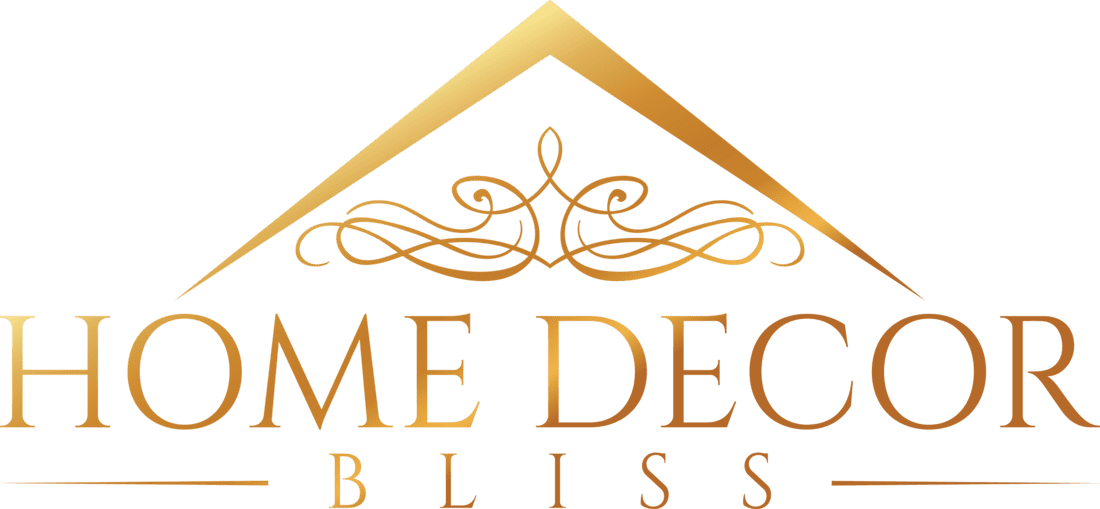





![Marble walled shower wall, 5 Best Types Of Shower Wall Panels To Consider For Your Bathroom Renovation [The Ultimate Guide]](https://homedecorbliss.com/wp-content/uploads/2023/07/shutterstock_2138160219-600x400.jpg)
